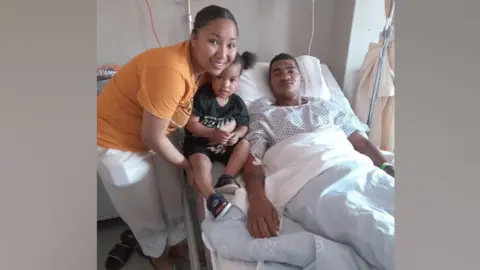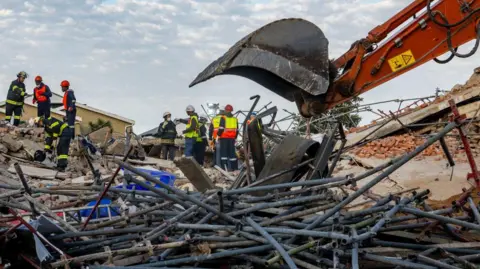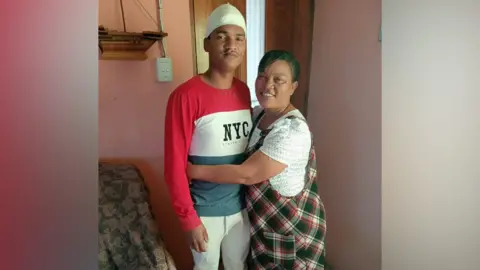'Trapped in hell' under collapsed building but pulled out alive
 Delvin Safers
Delvin SafersPinned under the rubble of a five-storey apartment block that collapsed in South Africa's coastal city of George, electrician Delvin Safers was trapped next to the motionless, silent body of his colleague.
He was dead.
Mr Safers was terrified. But most of all, at that moment, he was sad for the man who had become a friend after working together for seven months building the upmarket apartment block in a city along what is known as the scenic Garden Route.
The flats with a mountain view were now a pile of debris, twisted metal reinforcements and mangled scaffolding, burying dozens of those who had been working on the site.
Mr Safers remembered that his phone was in his pocket and with his one free arm he made his first call – a last word with his family as he was convinced he would not survive.
"I wanted to say goodbye as I was trapped and thought it was over for me,” the 29-year-old tells the BBC from his home in Mossel Bay, a town 40km (25 miles) south-west of George. He is recovering but sounds exhausted.
Just minutes before his accidental entombment last Monday afternoon, he had been discussing an electrical problem with his colleague on the third floor when, with no sound or warning, the floor collapsed underneath them.
"I can see that split second when we fell down because I still remember looking at [my colleague] when I was still falling."
 Getty Images
Getty ImagesAfter the initial shock, Mr Safers became more hopeful that he would survive.
“I didn't panic. For the next 15 hours or so I was calm. I was waiting there - waiting, hoping and praying someone will find us."
Above ground a complex rescue operation was under way through the night involving heavy-duty earth-moving machines, drills and excavators.
Dozens of people were also removing the rubble by hand in a slow process. Many of those who were rescued first had been working on the top floors.
But after a while Mr Safers' fortitude gave way and the hope he felt turned to despair. He was shivering uncontrollably, his legs were shaking in pain, his back was also hurting and he was beginning to doubt that he would get out alive.
The voice notes he was sending to his girlfriend and son, two-year-old Zyar, became increasingly desperate.
Breathing heavily and cursing from the pain he told them: "I don't think I am going to make it."
He could hear that the rescuers were close but every time they seemed to be getting nearer hours would pass and nothing would happen and it all felt too much, he says.
"I was in a very small space… I was laying on top of concrete pieces, broken concrete pieces for 28 hours.
"I couldn't move. I could only lay on my back or my one side. It was terrible, it was painful, it was cold and dark... very dark - it was hell."
It was thinking about his son that kept him fighting to stay alive.
 Delvin Safers
Delvin SafersHe scrolled through the photos he had of Zyar and remembered the last time he saw him. Mr Safers’ mother had also sent him a recent photo of his son to keep his spirits up.
After eight hours of working near him, the rescuers managed to free one of his colleagues.
"I couldn't breathe at the time. I knew I had to be strong and they were here now and would get me out," he says.
But alongside the relief, there were also the recurring feelings of guilt and sadness because a lot of people were still trapped inside – and some had died. The death toll now stands at 32.
Finally, after more than 28 hours under the rubble, Mr Safers was saved.
"I didn't get thirsty or hungry. When they offered me water, I took it but my body just didn't feel like eating or drinking. I don't know why.”
He was ferried to hospital to receive treatment for a cut to his head and a fractured rib.
He still cannot believe how he escaped with so few injuries and was discharged from hospital after just two days.
"It's amazing. I don't know how that happened... I am relieved, I don't know how it's possible [to get away with] minimal injuries but I did."
He is still obviously traumatised and desperately worried about all those he worked with who remain trapped after more than a week. There are 20 people unaccounted for.
Questions now turn to the cause of the accident, and the authorities say an investigation is under way.
Mr Safers says he does not remember any indication that something might be wrong, but thinks that if it turns out that shortcuts were taken in the construction, then people “should be held responsible for the lives lost and the people who may never work or walk again”.
 Getty Images/BBC
Getty Images/BBCGo to BBCAfrica.com for more news from the African continent.
Follow us on Twitter @BBCAfrica, on Facebook at BBC Africa or on Instagram at bbcafrica
